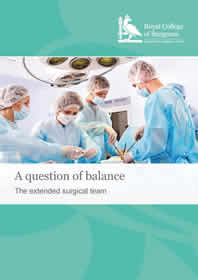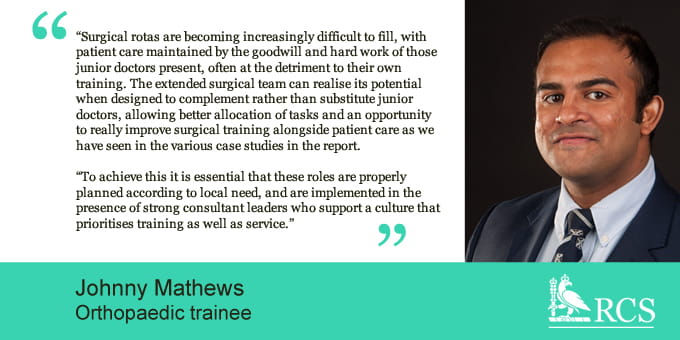The Extended Surgical Team
 New surgical workforce models that improve patient care are being established in the NHS all the time. ‘Extended surgical teams’ that include consultants, doctors in training, specialty and associated (SAS) doctors and non-medical practitioners have evolved in response to pressures on the service.
New surgical workforce models that improve patient care are being established in the NHS all the time. ‘Extended surgical teams’ that include consultants, doctors in training, specialty and associated (SAS) doctors and non-medical practitioners have evolved in response to pressures on the service.
A new report – A question of balance: The extended surgical team – commissioned by the Royal College of Surgeons (RCS) - investigates the experiences of staff working at eight case study sites that have introduced workforce models using the wider surgical team. It also explores the perceptions of surgical training held by surgical leaders and doctors in training.
The RCS set out to understand the role of non-medical practitioners in these extended surgical teams, the impact they can have on patient care and how they can enhance the training junior doctors receive. Views on extended surgical teams were overwhelmingly positive.
The report authors found that non-medical staff, such as physician associates, first surgical assistants and advanced nurse practitioners, often improved the co-ordination and continuity of patient care, providing a link between patients, consultants and trainees. They also helped free up junior doctors’ time so they could focus on their training.
The report identifies a number of ways that well managed use of the extended surgical team can support doctors and enhance training, including:
- Enabling doctors in training to leave the wards to attend teaching or theatres.
- Allowing trainees to stand in the best vantage point in theatre for learning.
- Helping new doctors settle into rotations more quickly.
- Reducing the occasions that higher surgical trainees are called out of theatre.
- Giving consultants’ confidence to step out of the room and leave senior trainees to operate with a skilled assistant.
The authors identified no basis for concern from the eight sites they visited that greater use of non-medical practitioners dilutes surgical training opportunities.
There are a number of challenges to fully realising the role of non-medical practitioners in the extended surgical team, including the significant variation of what they do in different hospitals, the level and nature of postgraduate qualifications, whether or not they can prescribe, and even the plethora of job titles being used which is confusing to patients.
The report makes recommendations for navigating these challenges and the RCS will use its findings design its own work with the extended surgical team going forward.

